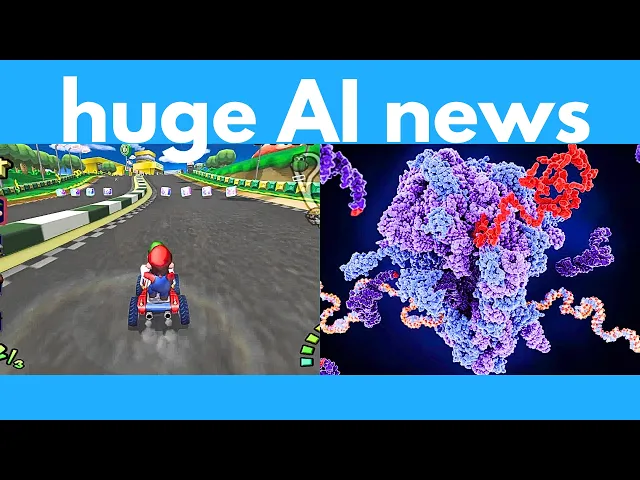Realtime AI video games, AI makes antibodies, video to 3D, colorize animations, new TTS

AI's new frontiers reshape digital experiences
In the fast-evolving landscape of artificial intelligence, breakthrough applications are emerging at a dizzying pace. The latest developments in real-time AI gaming, scientific research, and creative tools are fundamentally altering how we interact with technology. These innovations aren't just impressive technical feats—they represent the leading edge of what's possible when AI meets practical application.
Key Developments
-
Real-time AI game engines are transforming interactive entertainment by generating dynamic game worlds, characters, and narratives on the fly—allowing for truly responsive and infinitely variable gaming experiences.
-
AI-designed antibodies represent a scientific breakthrough with potential to revolutionize medicine by dramatically accelerating the development of treatments for diseases through computationally optimized protein structures.
-
Video-to-3D technology now enables the conversion of ordinary video into immersive three-dimensional models with remarkable fidelity, opening new possibilities for content creation in multiple industries.
-
AI-powered colorization and text-to-speech systems have reached new levels of sophistication, offering creators tools that previously required specialized expertise and significant resources.
-
Multimodal AI models are increasingly combining different types of inputs and outputs—like text, images, and audio—creating more versatile and human-like AI systems.
The Game-Changing Potential of Real-Time AI Gaming
Perhaps the most revolutionary development highlighted is the emergence of true real-time AI game engines. Unlike previous implementations that relied on pre-scripted scenarios or limited procedural generation, these systems can create entire worlds, characters, and stories dynamically as players interact with them.
This matters tremendously for the $200+ billion gaming industry because it fundamentally changes the economics and creative possibilities of game development. Traditional game creation requires massive teams working for years to craft limited experiences that players eventually exhaust. Real-time AI game engines promise the holy grail of infinite content—games that continuously generate new experiences tailored to individual players.
Companies like Nvidia are already demonstrating prototypes where AI generates assets, environments, and behaviors in response to natural language prompts or player actions. The implications extend beyond entertainment. These technologies could revolutionize training simulations, educational applications, and virtual collaborative spaces by making them more responsive and adaptable.
The Scientific Revolution in AI-
Recent Videos
How To Earn MONEY With Images (No Bullsh*t)
Smart earnings from your image collection In today's digital economy, passive income streams have become increasingly accessible to creators with various skill sets. A recent YouTube video cuts through the hype to explore legitimate ways photographers, designers, and even casual smartphone users can monetize their image collections. The strategies outlined don't rely on unrealistic promises or complicated schemes—instead, they focus on established marketplaces with proven revenue potential for image creators. Key Points Stock photography platforms like Shutterstock, Adobe Stock, and Getty Images remain viable income sources when you understand their specific requirements and optimize your submissions accordingly. Specialized marketplaces focusing...
Oct 3, 2025New SHAPE SHIFTING AI Robot Is Freaking People Out
Liquid robots will change everything In the quiet labs of Carnegie Mellon University, scientists have created something that feels plucked from science fiction—a magnetic slime robot that can transform between liquid and solid states, slipping through tight spaces before reassembling on the other side. This technology, showcased in a recent YouTube video, represents a significant leap beyond traditional robotics into a realm where machines mimic not just animal movements, but their fundamental physical properties. While the internet might be buzzing with dystopian concerns about "shape-shifting terminators," the reality offers far more promising applications that could revolutionize medicine, rescue operations, and...
Oct 3, 2025How To Do Homeless AI Tiktok Trend (Tiktok Homeless AI Tutorial)
AI homeless trend raises ethical concerns In an era where social media trends evolve faster than we can comprehend them, TikTok's "homeless AI" trend has sparked both creative engagement and serious ethical questions. The trend, which involves using AI to transform ordinary photos into images depicting homelessness, has rapidly gained traction across the platform, with creators eagerly jumping on board to showcase their digital transformations. While the technical process is relatively straightforward, the implications of digitally "becoming homeless" for entertainment deserve careful consideration. The video tutorial provides a step-by-step guide on creating these AI-generated images, explaining how users can transform...
